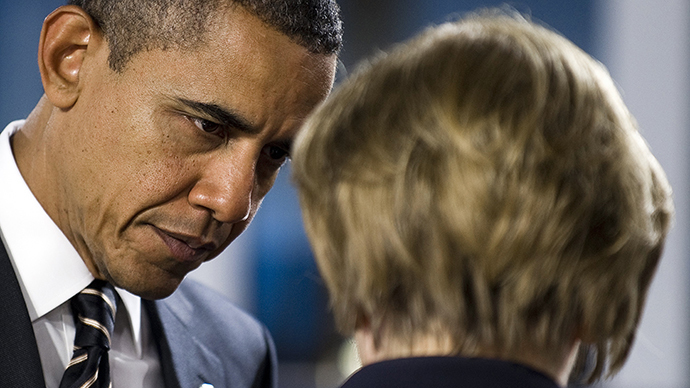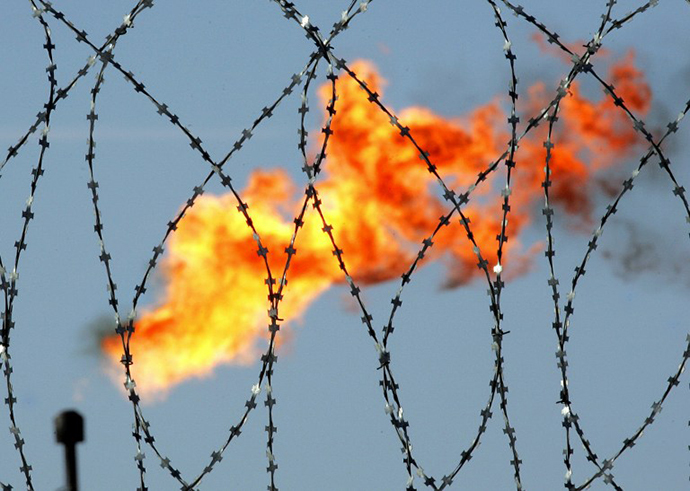Sanctions tit-for-tat: Catch minus 22

In between rounds of golf, President Obama is helping ease Europe into a lose-lose scenario of mutually-assured economic destruction via sanctions with Russia.
The realpolitik of the Ukraine crisis is that there is little way that any sanctions can avoid harming the EU’s declining economic power. The economy is flat and sanctions to date are estimated to have shaved 0.2-0.3 percent off the becalmed eurozone economy. Many cling to the counterproductive rebuke that the aim is to bring Russia to its knees. However that is just a leveraged version of the classical Pyrrhic victory.
Apparently Europe is now re-girding its loins for another round of sanctions. Even the custard pie of the Elysee Palace, French President Hollande, has turned coy about delivering the two warships being built for Russia in Saint Nazaire. True, ‘Monsieur Flanby’ may have just been demonstrating a degree of prerequisite bluster to keep in with the aggressive groupthink of the NATO club gathering in Wales last week, or perhaps he just wants more armaments at his disposal to protect against his former girlfriend.
The European nation offering to bear the brunt of sanctions remains the UK, although it may yet be less capable of affording this gesture of largesse to its becalmed European neighbors if Scotland happens to disappear into independence later in the month. The Cameron doctrine suggests excluding Russian entities from refunding on Western money markets. The EU has now chimed in with a suggestion to restrict Russian oil companies’ access to Western debt markets, while Obama even interrupted his hectic golf schedule to proffer a similar threat of exclusion from the dollar zone.

Incidentally, one of the less discussed areas of the cold war was how the Soviets operated in Western financial markets through the 100-percent-USSR-owned Moscow Narodny in London (and Singapore), as well as other banks in Paris, Frankfurt, Luxemburg and Vienna. Now Western leaders apparently intend to cut Russia out of Western markets just when there are a goodly few thousand Russian bankers living in Chelsea and other upmarket entrepots. While an acute challenge, it is not impossible to vastly reduce the influence of Western investment spigot from Russia.
Nevertheless, the West currently retains such financial dominance that the threat to Russia could be considerable. Then again the ongoing dominance of London as a leading financial center is already threatened by rising centers in Asia - which leads to the issue that it might cost more in the short term, but ultimately Russia can pivot East to raise the funds its government and corporates require.
London could be gradually sidelined as a global cash center. Indeed, the West could endeavor to close its payment systems to Russian banks, but then again the highly analogue SWIFT network which forms the basis of banking payments from the West is spectacularly outmoded anyway. A new payments system backed by Russia (perhaps based on the bitcoin blockchain), would be a welcome modernization to many other nations to boot, allowing many emerging nations to make a great leap forward to the next stage of digital payments, leapfrogging aged legacy Western systems.

Meanwhile, Russia is pondering a closure of its airspace to Western airlines seeking the established primary route from Europe to the Orient - and thus costing airlines a small fortune in extra fuel.
In such a feverish atmosphere of tit-for-tat, much perspective has already been lost. Moreover, the desire to be perceived as a strong leader drives economically-irrational responses. In the case of the West, not only is the European economy being pushed further into decline, but ongoing plans call for already hard pressed Western taxpayers to effectively subsidize the two decades of Ukrainian government failure to get a grip on the economy. Europe’s citizens appear doomed to groundhog days of paying for every politicians’ failure, several times over.
By inducing negative growth as an economic weapon, the results are rarely an outright victory, unless the aggressor has a massive economic advantage. In a bygone era perhaps that was once true of Europe. However now the EU is a fragmenting morass of failed super-state ambitions saddled with a crippled single currency. For the vast army of unemployed Europeans, the application of more sanctions is an act of economic vandalism. A ‘catch minus 22’ situation is evolving where both the EU and Russia threaten to bind themselves together in a pure lose-lose scenario.
The statements, views and opinions expressed in this column are solely those of the author and do not necessarily represent those of RT.
The statements, views and opinions expressed in this column are solely those of the author and do not necessarily represent those of RT.













